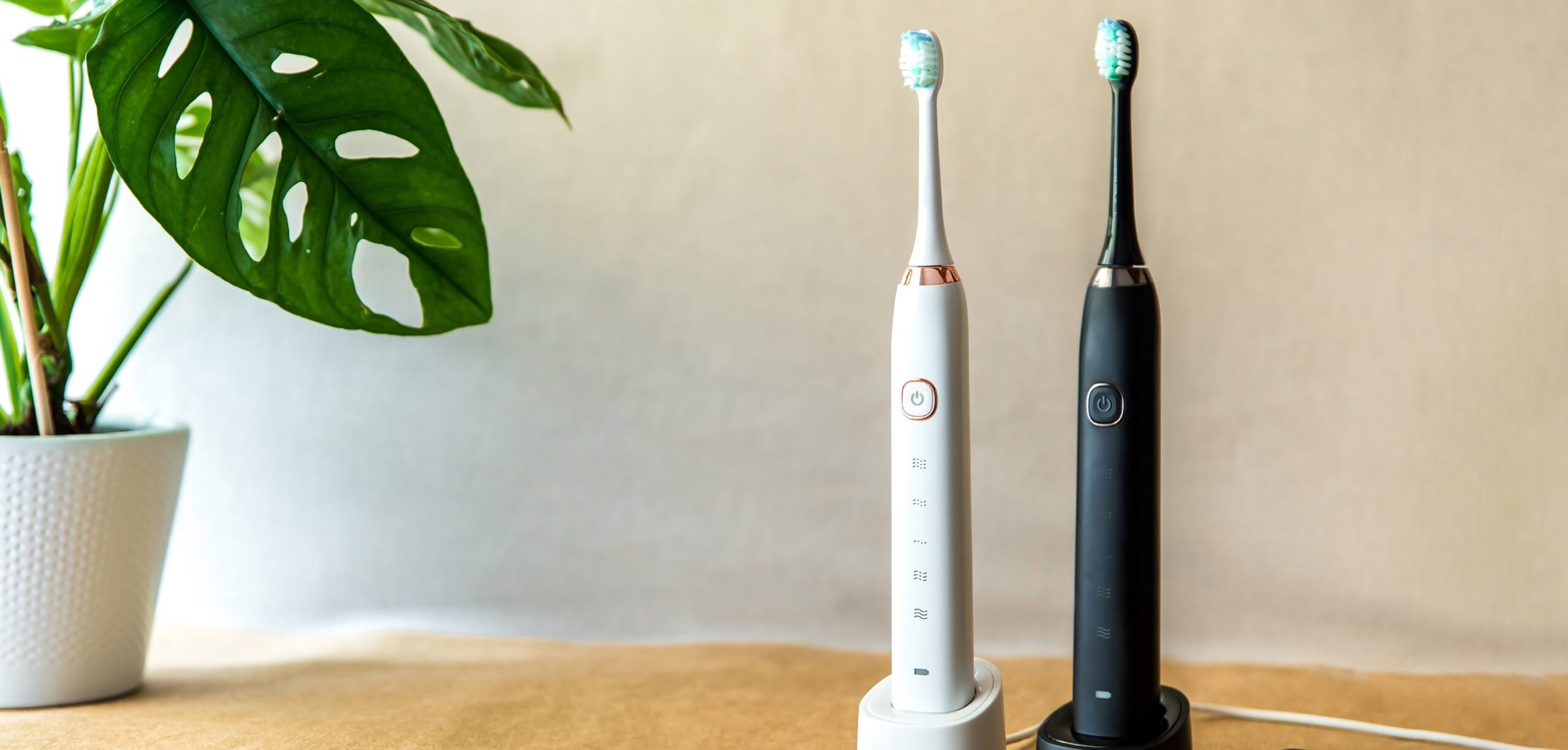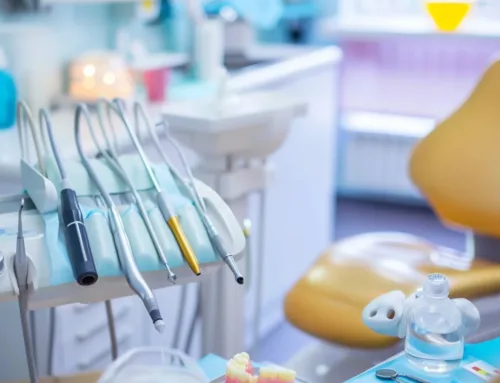Do Sonic & Ultrasonic Toothbrushes Clean Better?
The toothbrush is the cornerstone of good at-home oral care habits, but with so many different brands and styles of toothbrushes to choose from, how can you find the one that’s best for you? Should you go with something more technologically advanced like a sonic or ultrasonic toothbrush? We’re here to explain exactly how these oral care devices work, and if they’re really worth considering when looking for a new toothbrush.
It’s no secret that everyone wants to have a smile that looks great. Keeping your teeth, gums, and whole mouth healthy is a pretty simple process, but it takes consistency and diligence with a good oral healthcare routine and regular dental checkups. The better you take care of your teeth at home, the better your dental checkups will go, and the less likely you will be to develop a wide range of common oral health problems. So, how can you establish an effective at-home oral care routine that will stave off tooth decay and other dental issues? It all starts with the humble toothbrush.
Health Benefits of Regular Toothbrushing
From the time we are small children, we are told of the importance of brushing our teeth, and rightfully so. Keeping our teeth clean every day is vital to maintaining a good state of overall health. As we eat and drink each day, an environment is created in our mouths that allows bacteria to grow and multiply. If left unchecked, these bacteria can lead to many different types of harmful health problems, such as:
- Tooth decay and cavities
- Gum infections and gum disease
- Bad breath and halitosis
- Yellowing and discoloration of the teeth
- Sensitive teeth and soreness in the mouth
- Receding gum lines and root exposure
You see, as bacteria builds up in the mouth, particularly on the surfaces of the teeth and in the surrounding gum pockets, it creates an acidic environment that works to erode tooth enamel. This is the process that causes teeth to decay as the hard protective enamel is eroded and weakened. In addition, as bacteria thrives in the mouth, it can lead to infections in the surrounding soft tissues and gums. These infections can spread, resulting in gum disease and periodontitis. If the infection progresses into the root or inner pulp of the tooth, it can require root canals or even tooth extraction in order to treat the condition.
Toothbrushing works to prevent these types of dental health problems from occurring by scrubbing away the bacteria, which accumulates in the form of sticky plaque around the teeth and gums. By removing these plaque deposits, regular tooth brushing keeps the mouth healthier, the breath fresher, and tooth enamel stronger. Brushing the teeth at least twice a day is the best way to remove this plaque from the mouth before it has an opportunity to harden and bond to the tooth surface in the form of tartar. Once tartar forms on the teeth, it cannot be removed by a regular toothbrush, and must be scraped off during a professional dental checkup using specialized tools.
Brushing the teeth, flossing regularly, and rinsing with an antibacterial oral rinse are the basic elements of an effective at-home oral care routine. However, when shopping for a new toothbrush, you’ll be presented with a multitude of styles to choose from, including traditional manual toothbrushes, electric models, and even devices that use sonic and ultrasonic technology. Do these more advanced styles of toothbrushes really hold advantages over other types? Let’s explore how sonic and ultrasonic toothbrushes actually work by using sonic energy to help clean the teeth.
How Does Sonic Energy Work When Cleaning the Teeth?
The biggest thing that sets both sonic and ultrasonic toothbrushes apart from other styles is the high-intensity sound waves that the devices produce as you’re brushing your teeth. As you move the sonic or ultrasonic toothbrush over the surfaces of your teeth, they continually emit vibrations that transfer energy from the brush to your teeth in the form of soundwaves. The purpose of these rapid soundwaves is to create oscillations in the surfaces of the teeth to loosen stuck-on bacteria and plaque and make it far easier to brush and rinse away.
Some deposits of plaque can be particularly stubborn, especially in those hard-to-reach spots in between teeth and in the back of the mouth. The addition of sonic waves to the toothbrushing process works to make these spots easier to clean and increases the overall cleanliness of the mouth after each brushing session is completed. All other things being equal, studies have shown that sonic and ultrasonic toothbrushes are more effective at removing plaque and bacteria from the teeth than a regular manual toothbrush.
What’s the Difference Between Sonic & Ultrasonic Toothbrushes?
While their names sound quite similar, there are distinct differences between sonic and ultrasonic toothbrushes. Both types are electronically-powered toothbrushes, and both utilize soundwaves as part of their cleaning process, but sonic and ultrasonic toothbrushes differ in one very specific area. Sonic toothbrushes combine physical movement along with sound vibrations, whereas ultrasonic toothbrushes rely solely on high-intensity sonic vibrations.
Since ultrasonic toothbrushes do not have any physical movement incorporated into their bristles, they require the user to focus the brush contact on each area of the teeth for a certain amount of time for optimum results from the ultrasonic vibration effect. For this reason, many people tend to prefer the dual-action of a sonic toothbrush. However, fans of ultrasonic brushes report a more pleasing and relaxing sensation while brushing thanks to the intensive vibration and massaging action that ultrasonic models can provide. Both are effective at cleaning the teeth, so it ultimately comes down to personal preference on which style you may want to go with for your own oral care routine.
Are Sonic Toothbrushes Really Better Than Regular Toothbrushes?
Clearly, sonic and ultrasonic toothbrushes have very unique characteristics that differentiate them from regular toothbrushes, but at the end of the day does this really mean they’re a better choice for your own dental care? The answer is yes, but it depends on a few different factors. First and foremost, you need to follow the instructions for sonic and ultrasonic toothbrushes carefully to get the best possible results. Because of their added technology, you can’t simply scrub away on your teeth with them the way you do with a regular toothbrush.
Putting too much pressure on the teeth or scrubbing too vigorously with a sonic or ultrasonic toothbrush can result in irritation or soreness. To help prevent this, many of the most popular sonic and ultrasonic toothbrushes will include a pressure sensor and countdown timer built into them to notify the user when they are pressing too hard, and when the optimum brushing cycle is complete. Some even have custom brushing programs that prompt the user when to move to the next area of the teeth, making it even simpler to get the best possible clean for your teeth.
In addition, you should also continue to supplement brushing with a sonic or ultrasonic toothbrush with regular flossing, as this works to provide even better removal of stuck-on plaque and hidden food deposits in between the teeth and under the gum line. Finally, completing your oral care routine by thoroughly rinsing with an antibacterial mouthwash will remove even more bacteria and lingering particles from your mouth, leaving it feeling fresh and sparkling clean.
Get Even Better Results by Sticking to Your Regular Dental Visit Schedule
Adding a fancy new sonic or ultrasonic toothbrush to your daily dental care toolbox is certainly a good way to keep your teeth cleaner and your mouth healthier, but it’s not a substitute for regular visits to your dentist for a professional checkup and cleaning. Even if you’re doing a great job clearing away stuck-on plaque and preventing tartar from building up, there are many reasons why a dental checkup is so important. Dentists and dental hygienists see things that you simply can’t see, and we’re not just talking about x-rays. The trained eye of a dental professional will be able to spot the early warning signs of potential dental issues before they progress to the point of becoming a real problem. The key word here is prevention, as it’s far better to avoid problems in the first place than it is to treat them after they’ve developed. Plus, it feels pretty good to hear from your dentist that you’ve been doing a great job taking care of your teeth!
If you’re due for a dental checkup, there’s no reason to wait! Contact the team here at Georgian Dental to arrange for your next visit to our dental clinic. We look forward to seeing your beautiful smile walk through our doors soon!
Appointment Request
If you’re interested in any of our procedures, and would like to meet with one of our dentists to discuss options, costs and get additional information, complete this short form and we’ll give you a call to arrange for a no-obligation appointment at our Barrie clinic.










